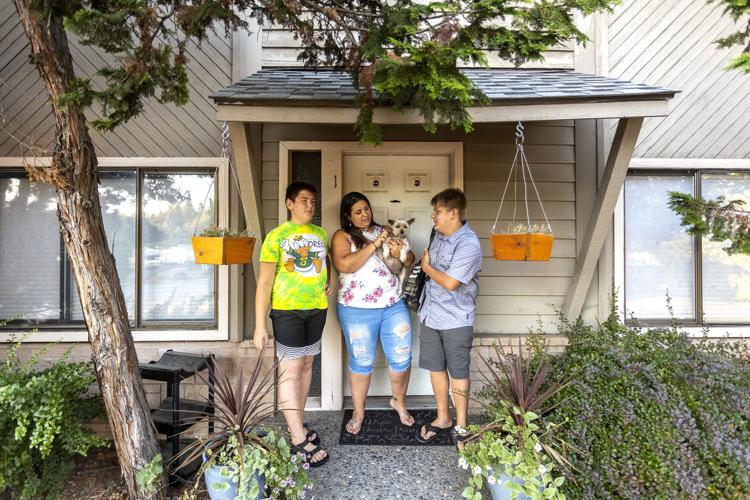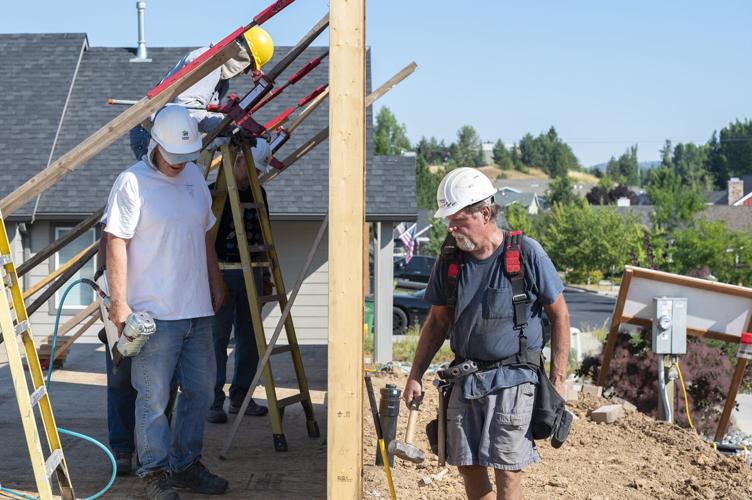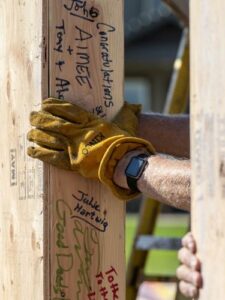
Rural housing shortage impacts everyone, even those with homes
Listen
(Runtime 4:29)
Read
BY ELAINE WILLIAMS LEWISTON TRIBUNE
More than half of all metro areas in the United States are facing a housing shortage and affordable housing is difficult to come by nationwide. Rural areas are no exception. This lack of affordable housing impacts daily life, even for those who already have a home. This is part one in an ongoing series on rural housing reported by the journalists of NWPB and the Lewiston Tribune.
Aimee Martinez is frying up taco meat for dinner for her twin boys. Martinez works full-time as a contracted companion for individuals with dementia.
She points to a metal bowl holding roughly a pound and a half of hamburger that cost about $10 more than she’s used to paying.

Alex Poulsen, right, and Tony Poulsen react as their mom, Aimee Martinez, looks up the name of one of their teachers that they say was in a boy band while they eat dinner at their rental home in Moscow, Idaho. (Credit: August Frank / Lewistion Tribune.)
That’s not the only cost that’s up for Martinez. She worries about keeping a roof over her head.
“There’s always something. I mean, everything’s just cost more money,” said Martinez. “I’m paying $60 more a month for the same unit.”
Martinez now pays $835 for her two-bedroom townhouse in Moscow, Idaho.
The increase was low enough that she could afford to stay, even on her tight budget. But she knows how precarious her situation is—if the rent increases much more, she would need to move.
Statistics indicate the circumstances Martinez is facing are becoming more and more common as thousands are forced to make difficult decisions amidst a housing shortage impacting every corner of the Northwest … no matter how remote.

Steven Peterson, clinical associate professor of economics at the University of Idaho. (Courtesty: University of Idaho.)
“It wasn’t just Coeur d’Alene and Boise that the housing price spikes took place. It was in almost every rural community in the state,” said Steven Peterson, clinical associate professor of economics at the University of Idaho. Peterson has spent a decade as a realtor and follows the market.
“I was frankly, the word [is] shocked, when I first realized how widespread the price increases were across Idaho, both in urban and rural areas,” said Peterson.
And as prices increase for housing, people have less to spend on other necessities.
“Rising home prices reduces real income, so it’s making people poor,” Peterson said. “A greater portion of your home, of your income, is going for housing expenses. And that is basically reducing the standard of living for a significant portion of the population. Now, others are benefiting from that too. Right? But it reduces the affordability, the general affordability of people in your cities.”

Supervisor Dave Stradley, right, observes one side of the raised wall while constructing a home with volunteers from Palouse Habitat for Humanity in Moscow, Idaho. (Credit: Zach Wilkinson / Lewiston Tribune.)
In the past, moving was all too familiar to Aimee Martinez. She and her boys spent time in a shelter. They shared one home with her mother and another home with an ex. But Martinez counts herself lucky. She’s getting a new home through Palouse Habitat for Humanity.

A A A volunteer’s hand covers a wood frame signed by numerous people in honor of the home being constructed by volunteers of Palouse Habitat for Humanity on Leepike Court in Moscow, Idaho. (Credit: Zach Wilkinson / Lewiston Tribune.)
“The Habitat has blown my mind,” said Martinez. “I am beyond grateful.”
Martinez was selected out of 16 applicants, the highest number to apply since 2017, said Jennifer Wallace, executive director of Palouse Habitat for Humanity, in an email.
Martinez’s mortgage will be based on her income, which gives her financial security.
But Habitat for Humanity is a solution for just a handful of people. Remember, Martinez was one of 16 applicants to get chosen.
Other solutions could chip away at the problem of affordable housing itself, such as allowing higher-density dwellings in single-family neighborhoods, says Brian Points, the President of Points Consulting.
“I think [for] people who really think about this holistically, that’s really one of the best options we have for resolving the issues that we’ve got,” said Points. “Because there’s also extraordinary costs to building on raw ground, whether that’s installing utilities, putting in sidewalks, you know, following all of the new building code, rather than using some of the existing buildings … And all that stuff, it’s just extremely expensive in comparison to, you know, what you would call, ‘infill.’ Use the space that you have, that already has a lot of that infrastructure.”

Brian Points, President of Points Consulting. (Courtesy: Points Consulting.)
Points Consulting completed a report for the Clearwater Economic Development Association (CEDA) a not-for-profit group that receives money from the U.S. Economic Development Administration, and other sources, to assist 5 Idaho counties with projects, such as strategic planning and infrastructure development. CEDA also helps Latah County, where Aimee Martinez lives.
The success of CEDA and other groups pushing for more housing construction will have a large impact on everyone living in the Northwest, even those who own a home.
Brian Points said that the housing shortage effects everyone, even those currently housed, and that the situation should be important to all.
“If there’s not attainable housing, then you can’t expect to have people work jobs at your local companies,” Points said. “And so even if you don’t care so much about the communal aspect of it, you should care about the economic aspect of it, because you’re going to start seeing decreases in services and your lifestyle.”















